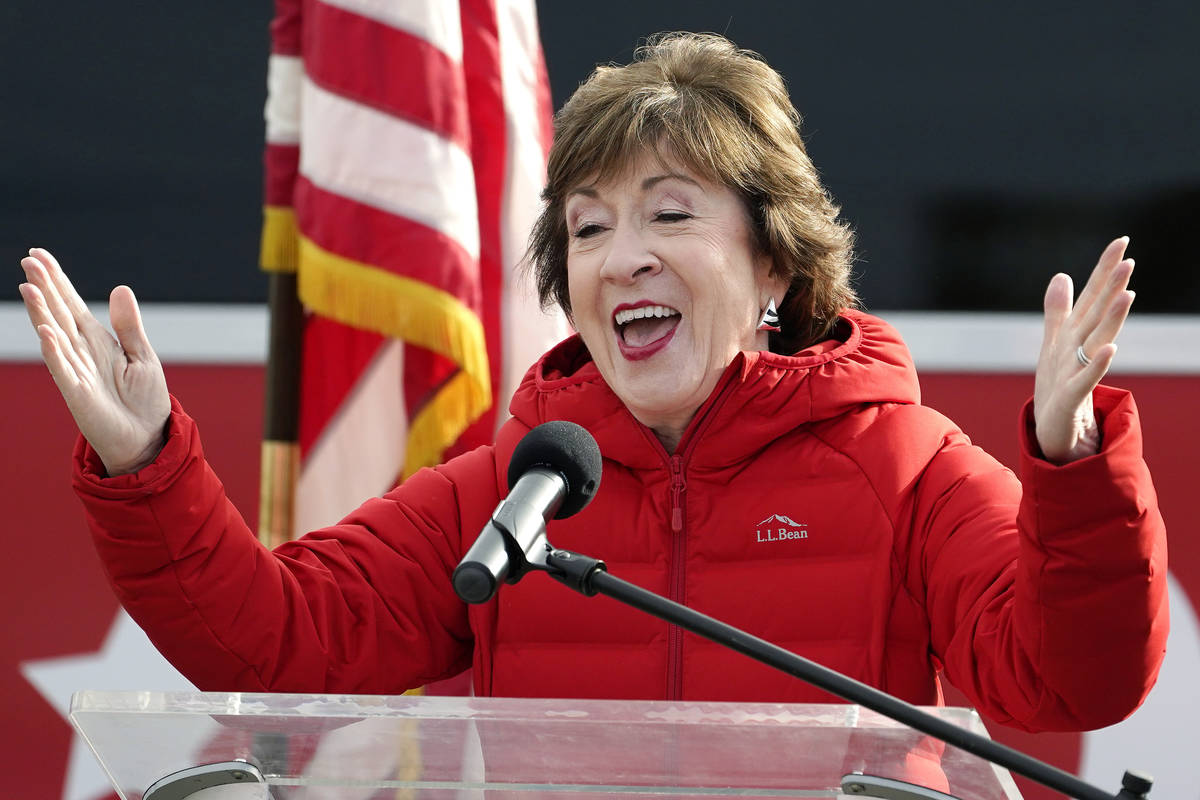Key win puts Republicans closer to Senate majority
WASHINGTON — Republicans clung to their majority in the Senate on Wednesday as GOP Sen. Susan Collins won a nail-biter in Maine and Democratic optimism was evaporating with votes continuing to be counted.
“It appears we’re in pretty good position,” said Senate Majority Leader Mitch McConnell, R-Ky.
But McConnell, who won his own race handily on Tuesday, noted that not all races were over and it was still to be determined whether “I’m going to be offensive coordinator or defensive coordinator.”
Republicans held a 53-47 majority before the election but were defending more Senate seats than Democrats, who outraised GOP candidates and were poised to make gains in the upper legislative chamber.
Democrats picked off seats in Colorado and Arizona, where former Gov. John Hickenlooper defeated incumbent Sen. Cory Gardner and former NASA astronaut Mark Kelly beat GOP Sen. Martha McSally, respectively.
But Republicans took back a seat in Alabama, where popular former Auburn football coach Tommy Tuberville defeated Democratic Sen. Doug Jones.
Late Wednesday, Democratic Sen. Gary Peters in Michigan defeated Republican challenger John James in a tight race.
GOP incumbents Dan Sullivan and Thom Tillis were ahead in tight races in Alaska and North Carolina but were expected to win as vote counting continued in those states late Wednesday.
In Georgia, GOP Sen. David Perdue was trying to avoid a runoff with Democratic Jon Ossoff.
A special election for the second Senate seat in Georgia will go to runoff on Jan. 5 with GOP Sen. Kelly Loeffler and Democrat Rev. Raphael Warnock.
House races
In the House, Republicans managed to claw back several seats lost to Democrats in the 2018 midterm elections that saw suburban voters turnout in droves in a referendum on President Donald Trump.
House Minority Leader Kevin McCarthy, R-Calif., said Trump’s “momentum has helped us expand our House Republican coalition.”
But McConnell praised Democrats for its fundraising models, like ActBlue, which provided nearly $2 million in small-donor campaign contributions for Democratic candidates who ran against McConnell and Senate Judiciary Committee Chairman Lindsey Graham, R-S.C.
Matt Mackowiak, a GOP strategist with Potomac Strategies, said the suburbs have drifted from Republicans and to Democrats who defeated moderate GOP lawmakers in 2018 to help take control of the House.
McConnell said that with attracting small donors, Republicans also needed to match Democrats with outreach to other groups.
“We need to win back the suburbs, do better with college-educated voters and we need to do better with women,” said McConnell, referring to the gender divide that Democrats have exploited.
Democrats have similar challenges, McConnell said. “They have the same problems: Why do they get crushed in rural areas?”
Sen. Catherine Cortez Masto, D-Nev., the chairwoman of the Democratic Senatorial Campaign Committee, was optimistic this week about Democratic chances to pick up seats and “flip the Senate.”
But she acknowledged that the races were competitive and in “some really tough states” for Democrats.
Big money
Overall, spending on the presidential, Senate and House races is expected to top a record-breaking $14 billion, according to the Center for Responsive Politics, a watchdog group that tracks money in politics.
Of the $200 million spent trying to unseat McConnell and Graham, the third-term South Carolina lawmaker told a news conference that the amount spent by liberals in New York and California “was the worst return on investment in the history of politics.”
But Graham appeared desperate in the final days before the election because of the money disadvantage and prognostications from groups that predicted a tilt for Democrats in down-ballot races.
The analysis website FiveThirtyEight said Democrats are favored to win back the majority of the Senate.
But the money raised by Democrats, particularly after the Supreme Court confirmation of Justice Amy Coney Barrett, through small donors was cited by Republicans and Democrats alike for expanding the map of competitive races.
McConnell said Republicans were developing efforts to increase small-donor fundraising and to increase outreach to groups where the GOP has underperformed.
“We are very much aware of the challenges we have in the suburbs,” McConnell said.
Contact Gary Martin at gmartin@reviewjournal.com or 202-662-7390. Follow @garymartindc on Twitter.


